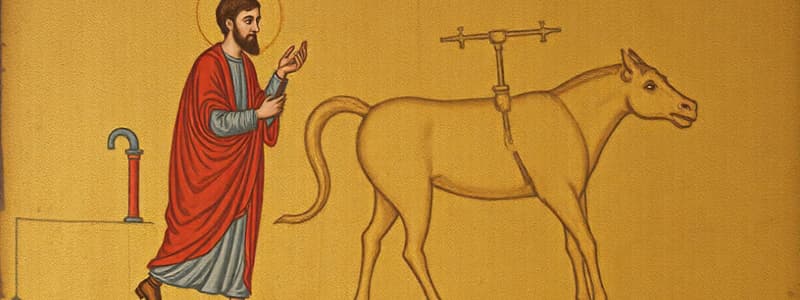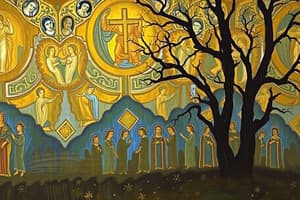Podcast
Questions and Answers
What type of literary works are gospel books primarily considered?
What type of literary works are gospel books primarily considered?
The Merovingian looped fibula exhibits cloisonné and chasing techniques common in which tradition?
The Merovingian looped fibula exhibits cloisonné and chasing techniques common in which tradition?
In which artwork can a fibula be seen being worn?
In which artwork can a fibula be seen being worn?
Classical influence in the Book of Lindisfarne is evident through which aspect?
Classical influence in the Book of Lindisfarne is evident through which aspect?
Signup and view all the answers
What significant architectural feature was added to Hagia Sophia after its initial construction?
What significant architectural feature was added to Hagia Sophia after its initial construction?
Signup and view all the answers
The placement of the mosaics of Justinian and Theodora in San Vitale serves to symbolize what?
The placement of the mosaics of Justinian and Theodora in San Vitale serves to symbolize what?
Signup and view all the answers
Which technique did the painters of the catacombs prefer for their artwork due to its permanence?
Which technique did the painters of the catacombs prefer for their artwork due to its permanence?
Signup and view all the answers
What is the term for the architectural element that transitions between flat walls and a round dome?
What is the term for the architectural element that transitions between flat walls and a round dome?
Signup and view all the answers
What is the maximum score that can be achieved on the assignment?
What is the maximum score that can be achieved on the assignment?
Signup and view all the answers
What does the line with underscores represent?
What does the line with underscores represent?
Signup and view all the answers
What is indicated by the line that states 'WRITE ANSWER ON FOLLOWING PAGE'?
What is indicated by the line that states 'WRITE ANSWER ON FOLLOWING PAGE'?
Signup and view all the answers
What does the score notation '_______ / 7' imply?
What does the score notation '_______ / 7' imply?
Signup and view all the answers
How is the assignment structured based on the content provided?
How is the assignment structured based on the content provided?
Signup and view all the answers
What is likely the format for submitting the answers based on the content?
What is likely the format for submitting the answers based on the content?
Signup and view all the answers
What can be inferred about the number of questions in the assignment?
What can be inferred about the number of questions in the assignment?
Signup and view all the answers
What does the scoring indication signify?
What does the scoring indication signify?
Signup and view all the answers
Which of the following statements about early popes is true?
Which of the following statements about early popes is true?
Signup and view all the answers
Who illuminated the Book of Lindisfarne?
Who illuminated the Book of Lindisfarne?
Signup and view all the answers
Which cultural influence is reflected in the Book of Lindisfarne's design?
Which cultural influence is reflected in the Book of Lindisfarne's design?
Signup and view all the answers
The group known for invading the British Isles from Scandinavia was the:
The group known for invading the British Isles from Scandinavia was the:
Signup and view all the answers
What is a colophon in manuscript terminology?
What is a colophon in manuscript terminology?
Signup and view all the answers
Which institution served as the primary centers of learning during the medieval period?
Which institution served as the primary centers of learning during the medieval period?
Signup and view all the answers
Which statement regarding early Christians is accurate?
Which statement regarding early Christians is accurate?
Signup and view all the answers
Which assertion about the separation of church and state during the covered time period is correct?
Which assertion about the separation of church and state during the covered time period is correct?
Signup and view all the answers
What was a common characteristic of medieval artists concerning their work?
What was a common characteristic of medieval artists concerning their work?
Signup and view all the answers
What is true about the representation of faces in Byzantine art?
What is true about the representation of faces in Byzantine art?
Signup and view all the answers
Which of the following is NOT true regarding parchment?
Which of the following is NOT true regarding parchment?
Signup and view all the answers
What does 'spolia' refer to in architectural terms?
What does 'spolia' refer to in architectural terms?
Signup and view all the answers
What term describes the necessity of cleaning the body for burial during ancient times?
What term describes the necessity of cleaning the body for burial during ancient times?
Signup and view all the answers
Flashcards
Late Antique Art Approximate Date
Late Antique Art Approximate Date
The approximate timeframe for Late Antique art.
Early Byzantine Art Approximate Date
Early Byzantine Art Approximate Date
The approximate timeframe for Early Byzantine art.
Early Medieval Art Approximate Date
Early Medieval Art Approximate Date
The approximate timeframe for Early Medieval art.
Gospel Books Purpose
Gospel Books Purpose
Signup and view all the flashcards
Merovingian Fibula Style
Merovingian Fibula Style
Signup and view all the flashcards
Fibula Wearable
Fibula Wearable
Signup and view all the flashcards
Hagia Sophia Additions
Hagia Sophia Additions
Signup and view all the flashcards
San Vitale Mosaics Purpose
San Vitale Mosaics Purpose
Signup and view all the flashcards
Blank space
Blank space
Signup and view all the flashcards
Score
Score
Signup and view all the flashcards
7
7
Signup and view all the flashcards
Answer space
Answer space
Signup and view all the flashcards
Write answer (Instruction)
Write answer (Instruction)
Signup and view all the flashcards
Task Completion
Task Completion
Signup and view all the flashcards
Following instructions
Following instructions
Signup and view all the flashcards
Score Area
Score Area
Signup and view all the flashcards
Early Popes
Early Popes
Signup and view all the flashcards
Book of Lindisfarne
Book of Lindisfarne
Signup and view all the flashcards
Viking Cultural Group
Viking Cultural Group
Signup and view all the flashcards
Colophon
Colophon
Signup and view all the flashcards
Monasteries
Monasteries
Signup and view all the flashcards
Early Christians
Early Christians
Signup and view all the flashcards
Church and State Separation
Church and State Separation
Signup and view all the flashcards
Medieval Artists' Pride
Medieval Artists' Pride
Signup and view all the flashcards
Byzantine Art
Byzantine Art
Signup and view all the flashcards
Parchment
Parchment
Signup and view all the flashcards
Constantine's Rescript
Constantine's Rescript
Signup and view all the flashcards
Evangelists
Evangelists
Signup and view all the flashcards
Catacombs
Catacombs
Signup and view all the flashcards
Iconoclasts
Iconoclasts
Signup and view all the flashcards
Hagia Sophia
Hagia Sophia
Signup and view all the flashcards
Spolia
Spolia
Signup and view all the flashcards
Study Notes
Late Antique, Byzantine, & Early Medieval Art Quiz
- Late Antique Art: Approximate date: 3rd - 6th centuries CE
- Legendary Founding of Rome: Romulus and Remus
- Early Byzantine Art: Approximate date: 6th - 9th centuries CE
- Iconoclastic Controversy: Approximate date: 8th - 9th centuries CE
- Early Medieval Art: Approximate date: 5th - 10th centuries CE
Multiple Choice
- 6. d. are letters written by saints after the death of Jesus
- 7. d. Celtic
- 8. a. Rebecca and Eliezar at the Well
- 9. b. interlace patterning with interweaving forms
- 10. a. enlargement of windows
- 11. c. as stand-ins to symbolize their semi divine status as participants in the mass
- 12. d. Russia
- 13. c. fresco forms a permanent bond with the wall
- 14. b. pendentive
- 15. c. martyred
- 16. a. Eadfrith
- 17. d. Celtic
- 18. a. Viking
- 19. c. colophon
- 20. b. monasteries
True or False
- 21. False
- 22. False
- 23. False
- 24. True
- 25. False
- 26. False
Fill in the Blank
- 27. The Edict of Milan
- 28. Evangelists
- 29. loculi
- 30. memoriae
- 31. Islam
- 32. Holy Wisdom
- 33. anamorphosis
- 34. Hagia Sophia
- 35. Annunciation
- 36. Lamentation
- 37. Resurrection
- 38. Francia (Frankish Kingdom)
- 39. Ireland and Northumbria regions of Britain
- 40. Theotokos
Matching
- 41. d. a vestibule positioned as a transitional zone in the front of the church
- 42. a. “high place” and focus of mass
- 43. b. perpendicular aisle next to the apse that clergy occupied
- 44. e. where male worshippers stood
- 45. f. constructed in front and framing the façade, housed catechumens
- 46. c. side aisles where female worshippers stood
Short Answer
- 47. Patrons of the Hagia Sophia: Emperor Justinian Architectural components: Dome, pendentives, arches, and columns.
- 48. Four Gospel Writers:
- Matthew: Angel with book and palm
- Mark: Lion
- Luke: Ox
- John: Eagle
- 49. Catacombs Reasons:
- Christian burial practices (avoid persecution)
- Burial locations and traditions
- 50. Icon: A sacred religious image Iconoclastic Controversy: A religious controversy in the Byzantine Empire about the use of religious images
- 51. Spolia Examples: Describe two Christian churches and the reuse of spolia.
- 52. Vienna Genesis: Details about the manuscript and art. Analyze how classic motifs are incorporated into the narrative.
Studying That Suits You
Use AI to generate personalized quizzes and flashcards to suit your learning preferences.
Description
Test your knowledge on the artistic movements of Late Antique, Byzantine, and Early Medieval periods. This quiz covers key concepts, important dates, and notable artworks from approximately the 3rd to the 10th centuries CE. Challenge yourself to see how well you understand this fascinating era of art history.




